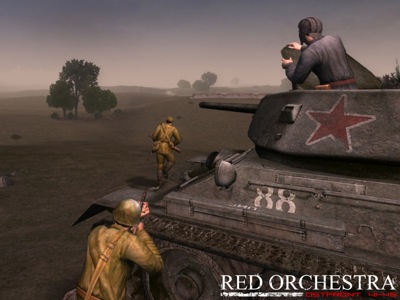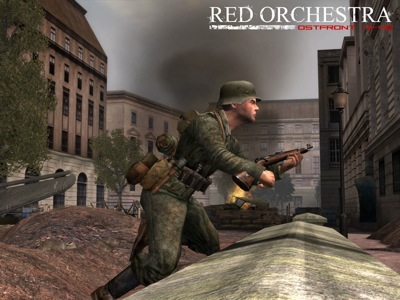Tripwire Entertainment are the people who’ve brought PC Gamers such titles as Red Orchestra, Killing Floor, The Ball, Zeno Clash and Dwarfs. Player Affinity’s Charles Battersby had the chance to speak with Tripwire’s Vice President Alan Wilson about their past projects, and the upcoming Red Orchestra 2.
Player Affinity:
Your company was created after you won the "Make Something
Unreal" competition in 2005, and received an Unreal license for your mod
Red Orchestra. How would you explain the difference between a mod and a
licensed game to our readers? Alan Wilson:
Pretty simple, really. When you buy a PC game, you are buying a licensed
game, handing over your hard-earned cash in return for a license to play that
game. A mod, on the other hand, is completely free. It is software built on top
of a licensed game. Many games come with mod tools (i.e. an SDK) that are
specifically designed to allow people to mod (modify) the base game so that it
becomes something different. The mod can be freely downloaded, but you have to
own a copy of the base game in order to play it.
Alan Wilson:
Pretty simple, really. When you buy a PC game, you are buying a licensed
game, handing over your hard-earned cash in return for a license to play that
game. A mod, on the other hand, is completely free. It is software built on top
of a licensed game. Many games come with mod tools (i.e. an SDK) that are
specifically designed to allow people to mod (modify) the base game so that it
becomes something different. The mod can be freely downloaded, but you have to
own a copy of the base game in order to play it.
Player Affinity:
How many people were in your company before you won the competition, and
did you need to add people to turn the mod into the full game that was released
on Steam?
Alan Wilson:
None. The company didn't exist until after we won MSU. Ok, that is being
a little facetious. Mod teams, partly because they are made up of unpaid
volunteers, can change size and shape quite unpredictably. We had something
like an average of 20 people working on the mod at any given time, with maybe
50-60 people rotating through at some time or another. We actually probably got
smaller as we transitioned to being a "real" company, as we had to
pay people - and there wasn't much money to go around! We actually had all the
skills we needed in the mod team, otherwise we wouldn't have won the contest.
Well, we did add an attorney, thinking about it - and accountants. The company
started out with about 5 employees and a bunch of contractors.
Player Affinity:
How large is the company now? What sort of people did you need to
add?
Alan Wilson:
Now we are about 25 people full-time, plus various contractors,
sub-contractors and so on. We've added an Office Manager, just to handle the
admin and day-to-day running. More artists, more level designers, more coders.
We go to outside specialists for specific skills - such as motion capture,
soundtrack and sound recording.
Player Affinity:
What makes Red Orchestra
different from all the other WWII shooters out there? Alan Wilson:
We've pretty much out-lasted all the others! Apart from that, we'd
probably cite attention to detail, authenticity and realism. Then we'd talk
about the gameplay in Red Orchestra. It
isn't any single brilliant feature - it comes down to the way all the pieces
play together, to give the player a really solid feeling of taking part in
combat. We've used the analogy that a lot of other shooters make you feel like
you could survive a war movie -
we like to make you feel you could survive a real war. We could talk about
individual systems such as the weapon handling and ballistics, the new
first-person cover system, movement system, our vehicles with fully-operational
(and visible) crew members, suppression and so on - or our map design. But it
is the combination of all of those things that dictates how the game plays out.
Alan Wilson:
We've pretty much out-lasted all the others! Apart from that, we'd
probably cite attention to detail, authenticity and realism. Then we'd talk
about the gameplay in Red Orchestra. It
isn't any single brilliant feature - it comes down to the way all the pieces
play together, to give the player a really solid feeling of taking part in
combat. We've used the analogy that a lot of other shooters make you feel like
you could survive a war movie -
we like to make you feel you could survive a real war. We could talk about
individual systems such as the weapon handling and ballistics, the new
first-person cover system, movement system, our vehicles with fully-operational
(and visible) crew members, suppression and so on - or our map design. But it
is the combination of all of those things that dictates how the game plays out.
The level designers really understand the systems, so they
can build maps that actually use them properly, use the full range, and always,
give the player choices and decisions - there is no "single" way to
do things, to get round a tricky MG nest or whatever. We want people to play it
the way that suits them, with the weapons that suit them. Rush it with grenades
and an SMG blazing, or pop smoke and flank carefully. Always choices!
Player Affinity:
Once Red Orchestra hit Steam, you
started releasing mods for it through Steam. Tell me about Mare
Nostrum and Darkest Hour; how was Tripwire involved in them? Alan Wilson: We
weren't directly involved. Probably helped them out from time to time, gave
them some pointers, told them it couldn't be done - so they could prove us
wrong! But once we looked at releasing them through Steam, we insisted on a QA
pass through. They had to get to near-professional quality levels first, which
was pretty hard work, given that they were both part-time, unpaid, volunteer
teams. And they both did a great job.
Alan Wilson: We
weren't directly involved. Probably helped them out from time to time, gave
them some pointers, told them it couldn't be done - so they could prove us
wrong! But once we looked at releasing them through Steam, we insisted on a QA
pass through. They had to get to near-professional quality levels first, which
was pretty hard work, given that they were both part-time, unpaid, volunteer
teams. And they both did a great job.
Read the second part of this interview in which we discuss
the Zombie shooter Killing Floor, The Ball and more HERE.